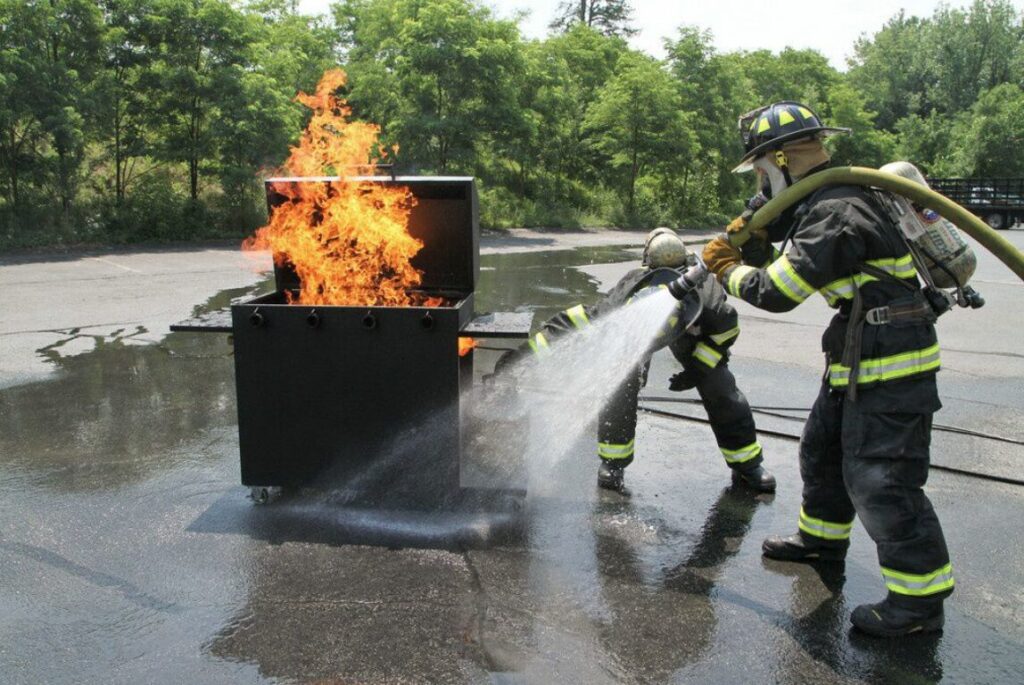Summer can be one of the best times of year for homeowners. From hosting cookouts and holiday get-togethers to just relaxing in the nice weather, the warmer months are a great time to make family memories that will last a lifetime.
But if open flames are part of those outdoor memories, you need to be safe. The risk of fires can significantly increase in the summer due to outdoor cooking and bonfires. If you’re looking to protect your home and keep your property value high, follow these seven tips to reduce the risk of creating a wildfire in your own backyard.
1. Take extra precautions when cooking outside
Few things can compare to lighting up the grill and tossing on a few burgers or dogs. But even the most cautious of cooks can’t predict wind patterns or accidents that could lead to a full-scale fire.
First, make sure your grill is kept somewhere away from flammable materials. This is important whether you’re grilling on a small patio or large, half-acre lot, and is especially crucial if you have kids or pets outdoors with you. One inadvertent bump could be all it takes to accidentally spread the fire to your backyard or to accidentally burn yourself.
In addition, dispose of any leftover charcoal, lava rocks, and ash carefully. Wait until they’ve fully cooled before tossing them to prevent them from sparking fire.
2. Keep an eye on electrical cords
If you’re using another type of outdoor device that has a plug, like an outdoor pizza oven, always plug it directly into an outlet; don’t use an extension cord. In addition, keep these electronics away from pools, sprinklers, or other water systems, and always unplug them after you’re done. You can use extension cords for lighter electrical uses, such as string lights or phone chargers — just make sure you don’t overload them.
3. Watch your fire pit or campfire
Roasting marshmallows with family and friends might be a summertime staple for many, but it’s important to take the necessary precautions to avoid an accidental fire. Make sure you build your fire pit area away from dry spots and shrubbery where the fire could easily spread.
In addition, clear the area of stray leaves, dry sticks, branches, grass, trash, or any other items that could potentially catch and spread fire each time before lighting. .
You should also ensure your family and friends sit a safe distance from the fire. Once you’re done using the fire pit, make sure the flames are extinguished completely to prevent the fire from reigniting.
4. Use fireworks safely
Be sure to always follow federal and local laws, but if you live in an area that allows homeowners to set off fireworks, make sure you use them carefully. Consult the instructions before use and light them somewhere away from fences, trees, and buildings to reduce the chance of starting a fire. You’ll want to make sure you have a water source like a hose nearby to help if a small fire does break out.
If your kids are playing with sparklers or other kid-safe fireworks, be sure you teach them how to properly hold and dispose of these materials to reduce your risk of creating a fire. You should also keep weather reports in mind. If you live in a dry area, setting fireworks off on a windy day could be a fire hazard, no matter how careful you are.
5. Be careful where you store flammable items
If you use a grill or have a fire pit in your yard, you likely have flammable materials around, such as lighter fluid or propane for gas grills. You might even have gasoline stored for your lawnmower and other yard tools. Be sure you keep these materials somewhere safe, and always follow the storage instructions, such as keeping them well-ventilated to avoid combustion and away from fire sources.
Stay safe this summer
Taking fire precautions is important for keeping your family, friends, and home safe in the summertime. If you’re looking for a home, make sure you keep your summer grilling and outdoor fire usage in mind when shopping for the right property. You can ask your real estate agent or brokerage about any fire prevention upgrades homeowners have made so you can find the safest backyard for your family.
Get Fired Up … It is Fire Prevention Week
Outdoor Fireplaces vs. Fire Pits: Which One is Right for Your Home?


